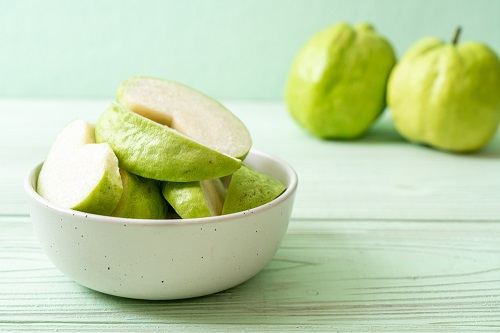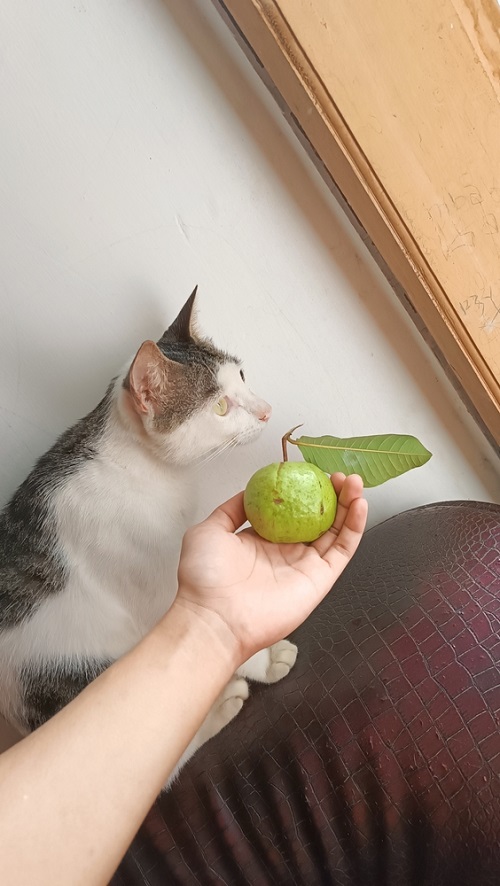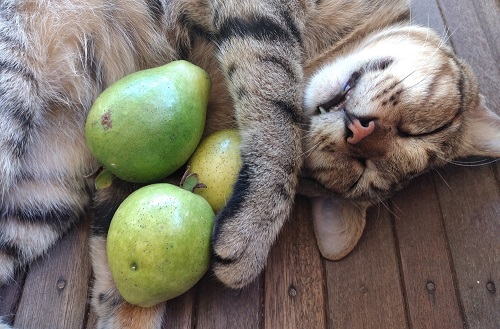Guava is a superfood for humans, but what about your feline friends? Can Cats Eat Guava? Here’s what you need to know.
If you’re a cat parent who loves snacking on guava, you may be wondering, Can Cats Eat Guava or Not? Keep reading to find out whether they are a safe and healthy snack for your beloved kitty in this article.
Can Cats Eat Bananas? Find out here
What Is Guava?

Native to the American tropics, Guava is a round or oval-shaped fruit that comes in different colors, including green, yellow, and red. Guava has a unique flavor that is often described as a mix of sweet and tangy; its flesh is soft and juicy with tiny seeds in the middle. It’s a good source of fiber, vitamins C and A, potassium, and other essential nutrients, making it a popular choice for health-conscious individuals. Guavas are often eaten fresh but can also be used in a variety of culinary applications, including juices, jams, and desserts.
Can Cats Eat Guava?
Yes, cats can eat guava but in moderation. It’s not toxic to them and can provide some nutritional benefits. However, keep in mind that guava is not a natural part of a feline’s diet, and too much fruit can lead to digestive issues. If your kitty accidentally ingests a small piece of guava, don’t worry, as it’s unlikely to cause any harm.
Does Guava Contain Any Nutritional Value For Cats?

Yes, guava can provide the following nutrients for the overall development of cats –
- Fiber: Guava is high in fiber, thus aiding in digestion and helps prevent constipation.
- Vitamin C: This tropical fruit is an excellent source of vitamin C. It can support your cat’s immune system and help protect against illness and disease.
- Vitamin A: Guava contains vitamin A, which is important for maintaining healthy skin, coat, and vision.
- Potassium: As it’s a good source of potassium, guava helps to regulate blood pressure and support healthy heart function.
- Antioxidants: Guava is rich in antioxidants, which can help protect against cellular damage and reduce the risk of chronic diseases.
How To Feed Guava To Cats?
- Wash and Chop: Take fresh guava, wash it thoroughly, and chop it into bite-sized pieces for your cat.
- Remove the seeds and skin: The seeds and skin of guava can be difficult for felines to digest, so remove them.
- Consider mixing with other foods: To make guava more appealing to your kitty, mix it with other cat-friendly foods, such as cooked chicken or canned pumpkin.
- Offer as a treat: While guava can provide some nutritional benefits for felines, it should be offered as an occasional treat to avoid digestive issues.
- Introduce gradually: Cats can be sensitive to dietary changes, so it’s best to introduce guava to your cat’s diet slowly and in small amounts.
Risks Of Feeding Guava To Cats

While guava can provide some nutritional benefits for cats, there are also some risks that are mentioned below:
- Digestive issues: Too much guava can lead to digestive problems in cats, such as diarrhea or upset stomach. The high fiber content in guava can also cause digestive discomfort if consumed in excess.
- Allergic reactions: Some felines may be allergic to guava, which can cause symptoms such as itching, redness, and swelling.
- Difficulty digesting seeds and skin: The seeds and skin of guava can be difficult for felines to digest, which can lead to gastrointestinal problems.
- High sugar content: Guava is a relatively high-sugar fruit. Thus its overconsumption can lead to weight gain and other health issues.
- Interference with medication: Some medications may interact with guava, so check with a vet before offering this fruit to your cat.
Can Cats Eat Guava? Quick Takeaways!
- Guava is a sweet, round tropical fruit rich in nutrients.
- Cats can eat guava in moderation, but it’s not a natural part of their diet.
- Guava offers nutrients like fiber, vitamins, minerals, and antioxidants to felines.
- Guava should be washed, chopped, and served seedless and skinless to cats.
- It can also be mixed with other cat-friendly foods and offered as an occasional treat.
- Risks of feeding guava to cats include digestive issues, allergic reactions, difficulty digesting seeds and skin, high sugar content, and interference with medication.



